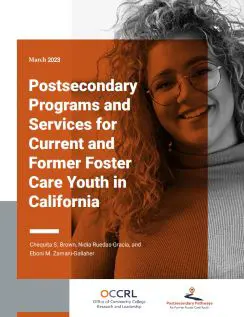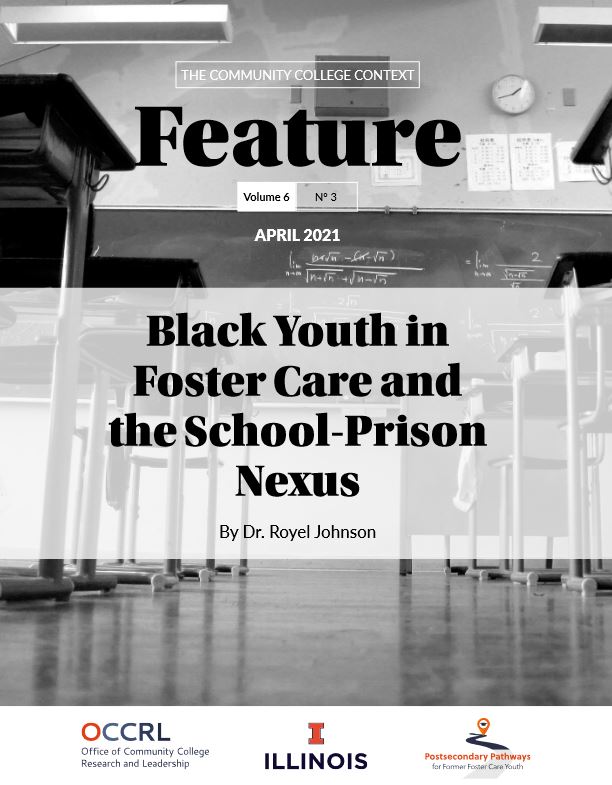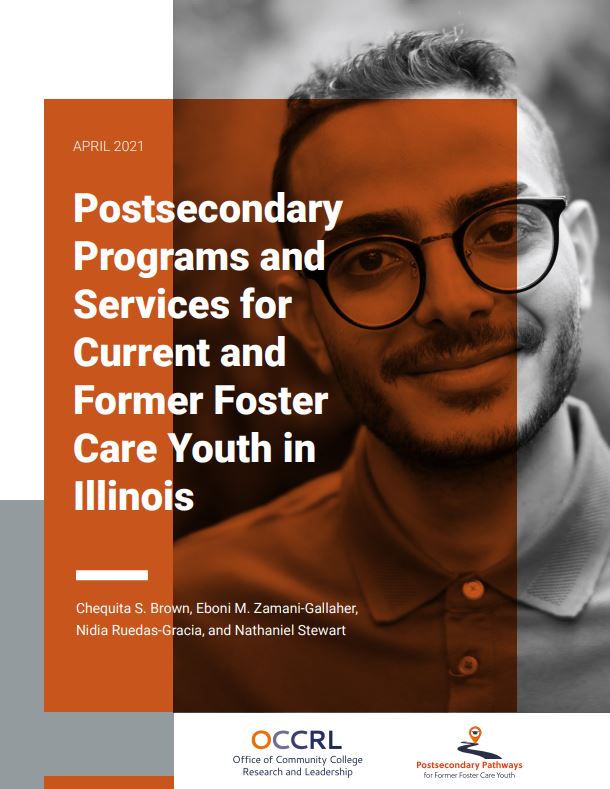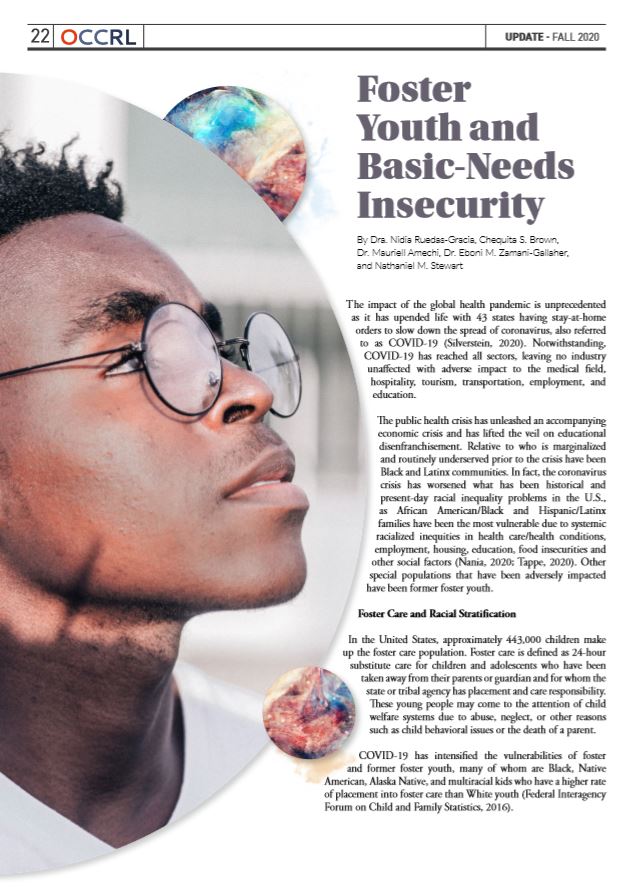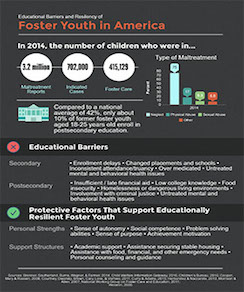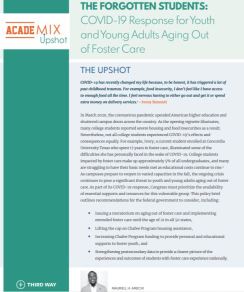
Postsecondary Pathways - for Former Foster Care Youth
This project has been completed and is no longer active.
However, we hope you are able to utilize its resources.
The Postsecondary Pathways for Former Foster Care Youth (PP-FFCY) reflects OCCRL’s commitment to examining and developing postsecondary pathways that support mobility for first-generation, underserved, and minoritized populations, as well as strengthening career pathways to promote seamless transitions from college to careers. This project endeavors to examine postsecondary access, opportunities, and supports for foster youth in Illinois and other states across the county in addressing access and outcomes of FFCY in Career Technical Education (CTE).
Purpose
The Postsecondary Education Pathways for Former Foster Care Youth (PP-FFCY) project is an exploratory study focused on postsecondary pathways for current and former foster youth in Illinois. OCCRL is conducting a comprehensive-needs assessment that provides a descriptive profile of current and former foster youth populations in Illinois; examines postsecondary access, opportunities, and supports for foster youth in Illinois; and addresses disparities in career and technical education (CTE) programs. This project reflects OCCRL’s commitment to examining and developing postsecondary pathways that support mobility for first-generation, underserved, and minoritized populations as well as strengthening and supporting career pathways to promote seamless transitions from college to careers.
Resources
OCCRL aims to increase postsecondary awareness, access, and attainment for current and former foster care youth by providing information on programs and other resources that offer holistic support and services. View the list of postsecondary programs and services.
Strategies to Cultivate a Foster-Friendly Culture on Community College Campuses
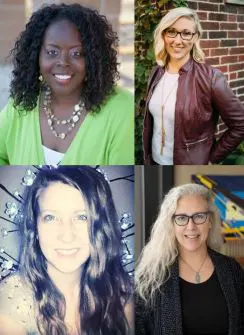 In this episode, Chequita Brown talks with Kate Danielson of the organization Foster Progress, as well as with Anna Wandtke and Tricia Wagner of Rock Valley College in Rockford, Illinois. The group discusses how to cultivate a foster-friendly culture at Illinois community colleges.
In this episode, Chequita Brown talks with Kate Danielson of the organization Foster Progress, as well as with Anna Wandtke and Tricia Wagner of Rock Valley College in Rockford, Illinois. The group discusses how to cultivate a foster-friendly culture at Illinois community colleges.
Navigating College as a Foster Care Alum
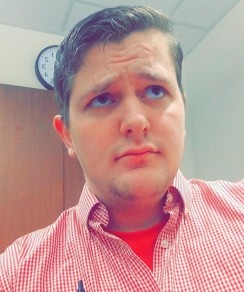 In this episode, OCCRL research assistant Chequita S. Brown talks with Jonathan Stacy, a sophomore at Heartland Community College who is pursuing his studies and a possible career in criminal justice.
In this episode, OCCRL research assistant Chequita S. Brown talks with Jonathan Stacy, a sophomore at Heartland Community College who is pursuing his studies and a possible career in criminal justice.
Listen to the podcast and view the transcript.
Key Elements to Successfully Connecting Foster Care Youth to Educational Resources for Postsecondary Success
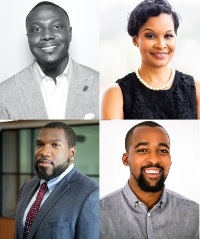 In this episode, Nathaniel Stewart talks with Mauriell Amechi, Regina Gavin Williams, and Blayne Stone Jr. about how the transitions and pathways to postsecondary education are similar and different for Black former foster care students. The scholars also discuss key elements to successfully connect foster care youth to educational resources that help advance the postsecondary education opportunities for this student population.
In this episode, Nathaniel Stewart talks with Mauriell Amechi, Regina Gavin Williams, and Blayne Stone Jr. about how the transitions and pathways to postsecondary education are similar and different for Black former foster care students. The scholars also discuss key elements to successfully connect foster care youth to educational resources that help advance the postsecondary education opportunities for this student population.
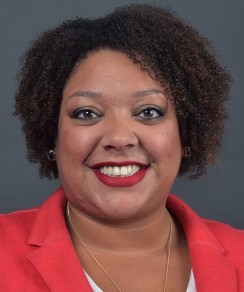
Maddy Day
The Impact of Campus-Based Support Programming on Foster Care Collegians' Postsecondary Access and Retention
In this episode, Chequita Brown of OCCRL talks with Maddy Day about the Fostering Success initiative in Michigan and the impact of campus-based support programming on foster carecollegians' postsecondary access and retention.
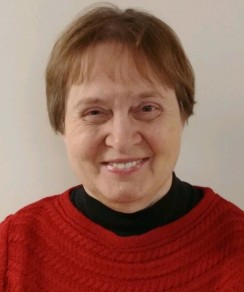
Patricia Palmer
How Youth-in-Care in Illinois Can Access Educational Resources to Pursue a Postsecondary Education
In this episode, OCCRL research assistant Chequita Brown continues the conversation on foster care youth by talking about with Patricia Palmer about accessing available resources in Illinois for youth-in-care who want to pursue a postsecondary education.
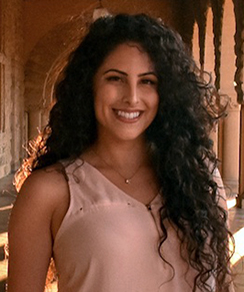
Nidia Ruedas-Gracia
Conceptualizing 'Sense of Belonging' Among Students From Historically Minoritized Racial Groups Within Higher Education
In this episode, Colvin Georges Jr., a research associate at OCCRL, talks with Dr. Nidia Ruedas-Gracia about what it means to have a sense of belonging and discusses her research in this area. They also discuss how a sense of belonging affects college students from historically minoritized racial groups.
Postsecondary Programs and Services for Current and Former Foster Care Youth in California
By Chequita S. Brown, Nidia Ruedas-Gracia, and Eboni M. Zamani-Gallaher
This brief highlights postsecondary programs and services in California that support youth in care, in addition to young adults who are aging out of foster care. Read more.
Tracking College-to-Career Pathways for Foster Youth
By Chequita S. Brown
In this OCCRL Thought Paper, Chequita S. Brown relates how tracking the data of students with foster care experience helps to recognize them as a legitimate student population. She offers recommendations on how to do this and conveys the many obstacles that can hinder the academic and career success of foster youth. Read more.
Black Youth in Foster and the School-Prison Nexus
By Royel Johnson
In this OCCRL Feature Brief, Dr. Royel Johnson argues that the foster care system, and more specifically congregate care facilities, are part and parcel to the enhancement of carceral state power. Read more.
Postsecondary Programs and Services for Current and Former Foster Care Youth in Illinois
By Chequita S. Brown, Eboni Zamani-Gallaher, Nidia Ruedas-Gracia, and Nathaniel M. Stewart
This research brief provides an overview of programs and services that helps strengthen postsecondary pathways for current and former foster youth in Illinois. Read more.
Foster Youth and Basic-Needs Insecurity
By Dra. Nidia Ruedas-Gracia, Chequita S. Brown, Dr. Mauriell Amechi, Dr. Eboni Zamani-Gallaher, and Nathaniel M. Stewart
This article discusses how COVID-19 has intensified the vulnerabilities of foster youth and former foster youth, many of whom are Black, Native American, Alaska Native, and multiracial children who have a higher rate of placement into foster care than White youth (Federal Interagency Forum on Child and Family Statistics, 2016). Read more.
(From the Fall 2020 UPDATE on Research and Leadership)
Exploring Equity in Postsecondary Education
By Heather L. Fox, Eboni M. Zamani-Gallaher
This chapter examines how postsecondary practitioners are encouraged to work collaboratively with child welfare agencies and other community-based organizations to identify and implement culturally responsive supports for former foster youth to promote early academic achievement. Read more.
The Forgotten Students: COVID-19 Response for Youth and Young Adults Aging Out of Foster Care
By Mauriell H. Amechi
This policy brief outlines recommendations for Congress to consider regarding the country's COVID-19 response, in an effort to prioritize the availability of essential supports and resources for youth and young adults who are aging out of foster care. Read more.
Talks at OCCRL’s Equity Academy Address Multifaceted Challenges, Inspire Innovative Solutions
The 2023 OCCRL Equity Academy brought together a mix of community college stakeholders who delved into several topics centered on how to advance equitable outcomes for diverse student populations. Attendees of the event included community college faculty, administrators, and state policymakers. It was a day filled with varied presentations that stimulated thought-provoking discussions.
Jewel Bourne, a research assistant at OCCRL who organized the event, said this year’s Equity Academy explored important issues that community colleges in Illinois are facing, with the objectives of ensuring the retention and completion of learners within these institutions statewide.
“I'm very excited for future iterations of the event and how we might incorporate lessons learned from it to continue growing and meet the needs of our community college faculty and practitioners across the state,” Bourne said.
The conference started with a keynote address by Terrance Bond, assistant to the president for equity, diversity and inclusion at Heartland Community College. In the relaxed manner he’s known for, Bond began his talk, “Me Against the World: Evaluating Collaborative Assumptions Towards Advancing Equity,” by sharing the inspiration he gets from the Tupac Shakur song “Me Against the World.”
Bond went on to explore the role of interpersonal dynamics within community colleges, emphasizing that students’ adjustment to higher education goes beyond simply absorbing the usual institutionalized material and context. He argued these students instead find meaning in their educational journey through their cultural, historical, and life experiences and concluded by presenting four key assumptions for advancing equity: the existence of oppression, the presence of barriers, the availability of solutions, and the shared responsibility of all individuals.
Dr. Osly J. Flores, a professor of education policy, organization and leadership at Illinois and an OCCRL affiliate member, related educational gaps in CTE programs, sharing examples that occurred during his time as an educational specialist in the Office of Career/Vocational Technical Education (CVTE) at the Massachusetts Department of Elementary and Secondary Education, which, according to Flores, has an unwavering commitment to equity and fostering discussions about equity in K-14 education.
“Applying a racial equity lens to CVTE programming is one way to develop culturally responsive practices and is a consistent approach, or paradigm, for addressing and remediating racial inequity and advancing racial equity,” Flores said during his talk.
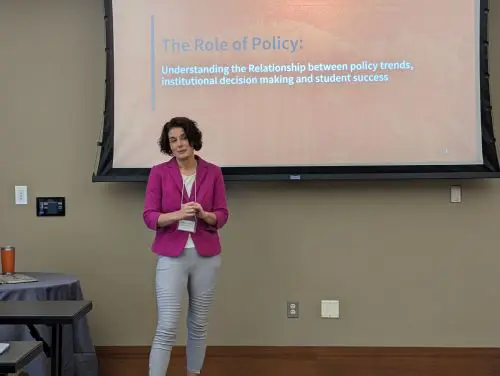
Dr. Stacy Bennett (at right), a teaching assistant professor in the College of Education, contextualized the discussions as they relate to Illinois, unraveling the roles of federal, state, and institutional policies in shaping higher education. Recent court decisions and legislation being introduced nationwide, which could be considered counterproductive for equity, were highlighted in her presentation, “The Role of Policy: Understanding the Relationship Between Policy Trends, Institutional Decision Making and Student Success.”
Bennett, who also serves as an OCCRL research associate, revealed the intricate web of public policy and education issues while highlighting the challenges faced when multiple topics are bundled together in a single bill. Currently, 37 bills in 21 states deal with diversity and equity. Dr. Bennett conveyed significant concerns regarding the impact these policies may have on students of color and the overall climate these policies and sentiments may create.
Additionally, she provided recommendations on fostering diversity and emphasized the significance of identity formation, professor assistance, alumni connections, diverse faculty representation, engaging programming, cultural and support centers, mental health support, and vibrant student organizations. Research shows that a sense of belonging is a key component for student success in college, yet policies geared toward belonging are not yet fully implemented to students of color, according to Bennett.
Other concurrent breakout sessions explored unique approaches to advancing outcomes for students. A talk by Ayinde Rochon, an OCCRL research assistant, focused on using photovoice, a powerful visual storytelling technique that can empower students. In an energetic and personalized presentation, OCCRL Director Lorenzo Baber delved into the leadership frames specific to community colleges, unveiling the strategies and qualities that contribute to effective leadership within these institutions.
Overall, the 2023 OCCRL Equity Academy was a dynamic, interactive gathering that brought together those who care about diversity, equity, and inclusion in higher education, as well as equity in career and technical education. The event provided an empowering opportunity to have future conversations that may foster further discussions surrounding equitable educational outcomes among varied stakeholders.
View photos of the 2023 OCCRL Equity Academy.
View a 2021 OCCRL Q&A with Terrance Bond, "Spotlight on Diversity, Equity, and Inclusion with Community College Leader Terrance Bond."
